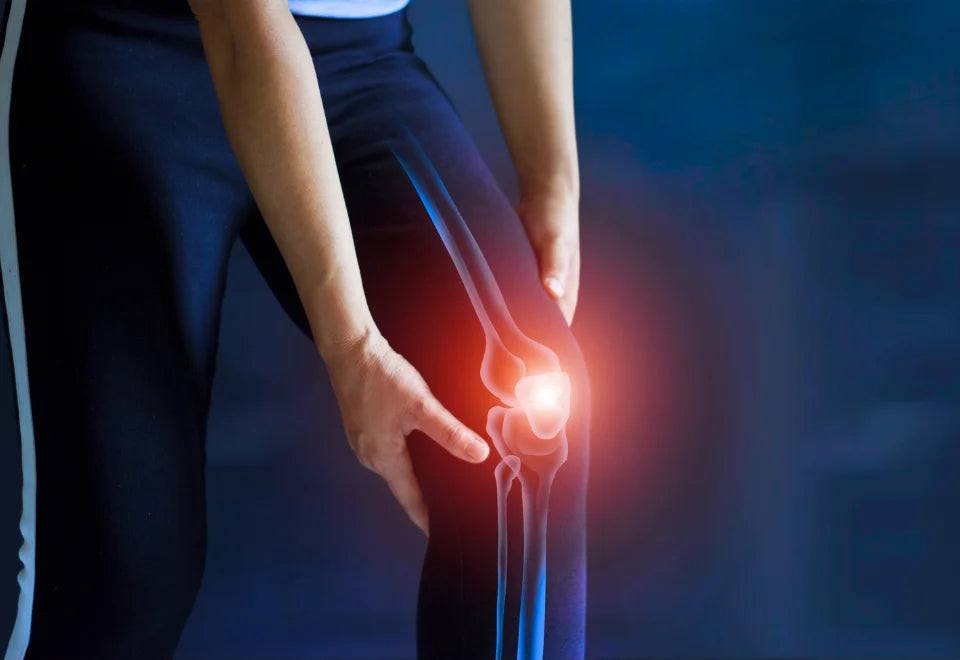As we age, our body becomes increasingly susceptible to severe infections, and chronic diseases. But do you ever wonder why we age? Ageing is a natural but complex process that results from a combination of environmental, genetic, and epigenetic factors. They do not just bring about visible changes like wrinkles and greying hair but also bring about changes in the biological, physiological, immunological, behavioural, and social processes. Chronic inflammation is a relatively new characteristic of ageing that leads to decreased cellular function and causes ageing. In this blog article, we will look at the bi-directional link between chronic inflammation and ageing.
What Is Chronic Inflammation?
Inflammation refers to the mechanisms by which an organism defends itself against harm or illness. While acute inflammation is a series of steps taken in response to infection or injury that eventually clears invading pathogens and promotes wound healing, chronic inflammation is a potentially pathologic process caused by the persistence of the initial trigger or dysregulation of signalling pathways that is harmful to health (Baechle et al., 2023). A disbalance between damage accumulation and the progressive inefficiency of the repair mechanisms contributes to ageing.
Factors Responsible for Chronic Inflammation in Ageing

Chronic infections: Accumulation of senescent cells and increased levels of pro-inflammatory mediators could lead to premature ageing of the immune system contributing to health risks.
Lifestyle changes: The evolutionary shift in the human lifestyle could lead to a mismatch contributing to systemic chronic inflammation. Furthermore, pressures induced by high-demand employment or excessive exposure to blue light after sundown have been related to chronic inflammation and bad health.
Low physical activity: Low levels of physical activity have been directly connected to elevated levels of CRP and pro-inflammatory cytokines, which promote numerous inflammatory-mediated disease changes.
Unhealthy diet: A diet heavy in processed food, trans-fatty acids, and salt has contributed to changes in microbiota composition and the immune system resulting in low-grade systemic inflammation.
Environmental factors: Humans develop chronic inflammation after being exposed to xenobiotics such as air pollution, hazardous waste products, and industrial toxins.
Consequence of Chronic Inflammation on Ageing
Chronic inflammation plays a critical role in accelerating the ageing process and has been implicated in multiple diseases among the elderly population. Chronic inflammation causes cellular damage and mitochondrial malfunction, which contribute to a vicious cycle that promotes inflammation.
Chronic inflammation can cause a variety of health concerns, including:
Cardiovascular diseases: Chronic inflammation of the tissues surrounding the cardiovascular system can increase the release of ROS and pro-inflammatory markers resulting in the progression of cardiovascular disease. Chronic inflammation can damage the heart's vasculature over time, leading to atherosclerosis and raising the risk of cardiovascular events.
Cancer: Inflammation increases cancer growth, invasion, and metastasis. Chronic inflammation creates an environment in which healthy cells mutate into malignant cells, promoting tumour formation.
Neurodegenerative diseases: As we age, oxidative stress inside the neurological system increases significantly, resulting in diminished regeneration capacity and functional degeneration of the nerve. As a result, older people are at a high risk of acquiring cognitive impairment or neurodegenerative illness.
Chronic obstructive pulmonary disease (COPD): A common condition of middle-aged and elderly individuals characterised by progressive damage to the lungs. Chronic inflammation contributes to the increase in oxidative stress in the lungs, contributing to the degradation of tissues. This results in the progression of COPD.
Diabetes: Chronic inflammation increases insulin resistance, which raises the chance of developing type 2 diabetes. Fluctuations in glucose levels after meals or hyperglycemia boost ROS generation, which contributes to oxidative stress. These inflammatory effects eventually diminish the body's ability to manage glucose, therefore developing diabetes and its associated complications.
Managing Chronic Inflammation in Ageing with Anti-inflammatory Supplements
Dietary therapies, microbiome-based interventions, supplements for inflammation, physical activity, and pharmaceutical interventions can all help to manage chronic inflammation as people age. Supplements for inflammation can provide further support to minimise chronic inflammation when taken with a healthy diet and an active lifestyle.
Omega 3 polyunsaturated fatty acids:
They are naturally found in olive oil and fish. Numerous clinical trials have reported their ability to resolve low-grade systemic inflammation in obese and healthy middle-aged and older individuals (Dugan et al., 2023).
Zinc supplementation:
Supplementing with zinc among deficient individuals can reduce systemic inflammation in older individuals and is known to have immune-enhancing properties which delay age-related diseases.
Vitamin D:
Supplemental vitamin D has been demonstrated to lower pro-inflammatory markers in the elderly.
Resveratrol:
Resveratrol, a natural compound found in grapes, berries, red wine, and nuts has been shown to suppress pro-inflammatory response and provide protection against inflammatory conditions.
Senolytics:
Senolytics, such as Quercetin and Fisetin helps target and remove harmful senescent cells, which drive chronic inflammation as we age. By clearing these cells, senolytics help reduce age-related inflammation and promote healthier ageing.
Spermidine:
It is shown to produce anti-inflammatory properties, and it also helps improve memory in older adults.
Apart from these, supplementation with flavonoids (fisetin, quercetin, and apigenin) and phytochemicals with anti-inflammatory properties (pterostilbene) have been shown to effectively dampen systemic chronic inflammation.
What Is Inflammaging?
"Inflammaging" is a non-resolving, low-grade, chronic inflammation process that occurs with age. It is a condition marked by high levels of inflammatory markers in the blood and tissues. Chronic rises in subclinical levels of inflammatory markers such as TNFα, IL-6, IL-1β, and CRP are considered markers of ageing. Inflammation mechanisms may include genetic susceptibility, central obesity, increased gut permeability, changes in microbiota composition, cellular senescence, activation of the NLRP3 inflammasome, oxidative stress caused by dysfunctional mitochondria, immune cell dysregulation, and chronic infections. Strong evidence suggests that inflammation is a risk factor for several noncommunicable diseases, including cardiovascular problems, cancer, osteoarthritis, chronic renal disease, depression, sarcopenia, type 2 diabetes, and neurodegenerative diseases including Alzheimer's and Parkinson's (Ferrucci & Fabbri, 2018).
Conclusion
Chronic inflammation is a key factor in the acceleration of the ageing process and the development of age-related chronic disorders, some of which are the leading cause of death among the elderly. Therefore, there is an urgent need to mitigate the effects of inflammation in ageing populations. Newer anti-inflammation strategies with promising results are being developed at a fast pace, which could revolutionise the field of anti-ageing. Personalising treatment approaches to improve longevity could be a realistic milestone to be achieved in the future.
FAQs
What is inflammaging?
Inflammaging is a condition where you develop elevated levels of inflammatory markers in the blood and tissues during the later stages of life could potentially lead to morbidity or premature death. They could potentially increase your risk of developing cardiovascular diseases, diabetes mellitus, chronic kidney disease, cancer, dementia, depression, or sarcopenia. Clinical trials have demonstrated efficacy in lowering cardiovascular disorders by managing chronic inflammation; however, their efficacy in avoiding other chronic diseases is not well documented.
Is chronic inflammation a symptom of ageing?
Yes, chronic inflammation is a symptom of ageing, and it is often referred to as inflammaging. As people age, their immune systems become dysregulated, resulting in a chronic, low-grade inflammatory disease. This immunological imbalance stimulates the production of pro-inflammatory mediators such as cytokines and chemokines, which causes chronic inflammation.
This chronic inflammatory phase becomes a characteristic of ageing and is associated with the development of various age-related illnesses, including cardiovascular disease, diabetes, neurological difficulties, and some types of cancer.
How to reduce inflammaging?
Consuming an anti-inflammatory diet such as fruits, vegetables, whole grains, healthy fats, and legumes can help reduce inflammation to some extent. In addition to a healthy diet, exercising regularly can regulate the immune system as they have anti-inflammatory effects on WBC and cytokines. Shedding the extra weight can reduce the chances of developing fat-led inflammation or the occurrence of type 2 diabetes. Practising yoga, breathing or other relaxation techniques can calm your nerves and reduce stress hormones contributing to chronic inflammation.
What are the indicators of chronic inflammation?
Symptoms of chronic inflammation are often subtle causing them to be often harder to spot or overlooked. However, some of the common symptoms include fatigue, body pain, depression or anxiety, gastrointestinal complications like constipation or diarrhoea, weight gain or weight loss, persistent inflammation, fever and joint pains. If you acquire these symptoms, they might be minor to severe and continue for months or years.
What problems can be caused by ageing?
Ageing results from a wide range of molecular and cellular damage that develops over time, it leads to a decrease in physical and mental capacity, increased disease risk, and untimely death. Common age-related diseases include osteoarthritis, chronic obstructive lung disease, diabetes, depression, and dementia. As you age, you may become more susceptible to a range of these issues.
What causes chronic inflammation in older adults?
Chronic inflammation in older persons can be caused by a variety of reasons, including a compromised immune system, senescent cell buildup, a poor diet, physical inactivity, and environmental stress. As we age, our bodies lose the ability to resolve inflammation, resulting in a chronic low-grade inflammatory disease.























Leave a comment
All comments are moderated before being published.
This site is protected by hCaptcha and the hCaptcha Privacy Policy and Terms of Service apply.